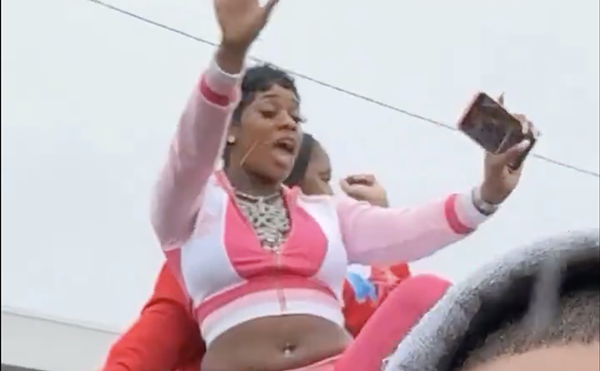The Public is one of the rare bands whose precision on its album is matched by the energy of its live shows. A December gig at Off Broadway found the quintet tearing through its more uptempo material while letting slower, burning cuts smolder for a bit. The band performed attired in suits and ties, and its straightforward, guitar-led sound recalls the simplicity of pub-rock with a twinge of new-wave's sharp licks. It's fitting, then, that the Public played a cover of "(What's So Funny 'Bout) Peace, Love and Understanding," a song written by pub-rock godfather Nick Lowe and popularized by new-wave king Elvis Costello. The song also embodies what works about Jon Hardy and the Public: sincerity and empathy wrapped in the irrepressible rhythms and melodies of rock & roll.
Guitarist Glenn LaBarre plays smooth leads against Hardy's brusque rhythm guitar. Bassist Shaun Lee, who played with Hardy in the alt-country act the North Country, gives a pliant, melodic counterpoint to the guitars, while drummer Tony Perolio offers the right balance of restraint and driving rhythms. New addition Johnny Kidd Jr. fills in by adding the keyboard and glockenspiel flourishes that give Love some color.
After forming in 2003, the band released Make Me Like Gold the next year. The Observances EP, featuring songs that veer more toward tight-cornered post-punk, arrived in 2005. The band took a break from playing live throughout most of 2007 to record its next album, which became the fall-released Working in Love.
For fans of earnest, rootsy rock & roll and genteel soul, it was worth the wait. The title of the record informs many of the eleven tracks; the ups and downs of relationships take center stage in Hardy's lyrics, returning to the central claim that love is something that takes effort. And although the album is hardly a cohesive narrative or concept record, the bulk of the tracks were inspired by Hardy's relationship with his ex-wife.
"Those songs are lyrically and musically straightforward," Hardy says. "I had been writing them over a year or so. They kind of started when I was still involved with my wife, Suzanne, and they kind of cover a period of time when all that was coming undone.
"At that time we were living in Memphis, and I had moved away. And I had all these songs, and they were for this specific woman — they weren't just general love songs. I had these ideas and I was gonna get them all together, and I was gonna go and play them for this woman. But that never happened."
Part of his trepidation stemmed from a fear of altering the meaning behind the songs. If you write a love song for someone who rejects you, does that song still sound the same? Can you still get up and sing it in a crowded bar? These are questions Hardy considered throughout the process of writing the album.
"It could have been that I had too much tied up in those songs," he says. "What's gonna happen if I play these songs and she doesn't like them — or what's gonna happen if she really likes them? When you have those problems with another person for a while, even coming to a positive place can be a little bit strange because you get used to something. Maybe you like that routine. Shoot, I don't even know if Suzanne has heard these songs. I mailed her an album, but I don't know if she's listened to it."
For Hardy, his songs became an outlet for the tribulations he had with his ex-wife. But at the same time, these tunes took on a life of their own. The songs on Working in Love are able to convey direct and definite emotions without being overly specific. Moreover, the final product doesn't come off as a breakup record or even a sad-sack lament; for all of the hard questions and sleepless nights that pop up in these songs, the overall tone is unerringly hopeful and positive. Hardy credits this dichotomy to his bandmates — and to Love's arrangements.
"A lot of those songs, if you just wrote down the words, they would be sad old love songs, but the music is pretty upbeat," Hardy says. "I don't know if many people have found that, but I hope that people find something positive there, because love is a great thing — it's a very positive thing."
Hardy's strength as a songwriter stems from his ability to present the complications of life and love without distilling the emotions into a trite cliché. The album-ending "Cassius Clay" has already become a fan favorite for its dreamy tone and its sweetly deceptive lyrics. When Hardy sings "Oh, baby, I'm like heavy rain/And you're the storm for 40 days" against a bed of echo-laden guitar and soft organ tones, it sounds like an earnest declaration. What that declaration states, though, isn't always clear.
In a sense, Working in Love can be thought of first and foremost as a soul record, the kind that goes above the markings of the genre. While certain genre signifiers are present (particularly the crack horn section that appears on many of the tracks), it's Hardy's willingness to lay his devotions and doubts on the line that offers a purer example of soul, rather than a by-the-numbers facsimile.
"I tend to think that I'm not really a musician," Hardy demurs. "When I was writing a lot of the songs, I was spending time in Memphis and Detroit, just hearing a lot of those old soul records, and they always seemed to be pretty straightforward to me." The influence seeped in and took root in these songs: a Wurlitzer electric piano guides a plaintive "I Work for Everyone," and raw, six-string energy collides with saxophones and trumpets in the foot-stomping, hand-clapping "Love Don't Work Like That."
Now that the songs are recorded and released, do they still retain their personal attachments? "That's another one of those questions that I don't know the answers to yet," Hardy says. "When we're playing them, it's hard to know exactly what's going on in your head and your heart. So afterwards you try to think of that — what do these songs mean to me right now, and what do these songs mean to Suzanne right now? That one hasn't been figured out yet."
9 p.m. Saturday, January 19. Off Broadway, 3509 Lemp Avenue. 314-773-3363.Jon Hardy and the Public: Working in Love, live.





